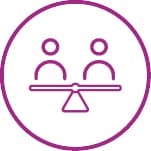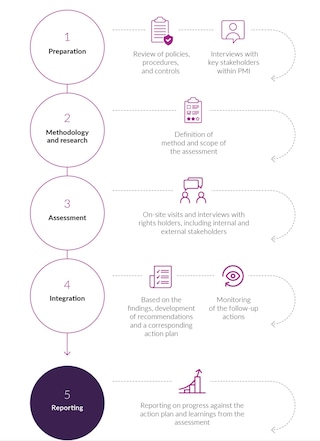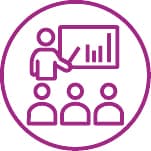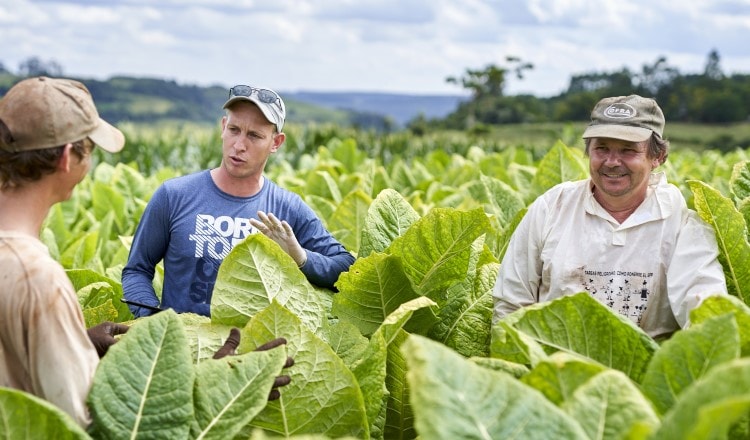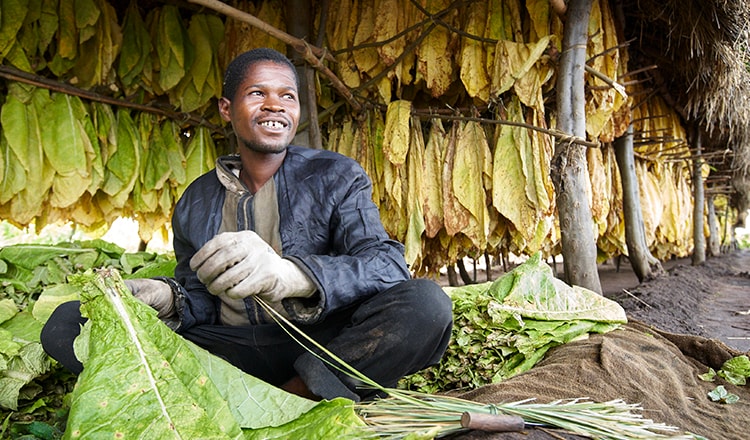Integrated Report 2019
| INTEGRATED REPORT 2019 |
Respect for human rights must be embedded in the corporate culture, allowing human rights principles to shape the way we work and guide interactions with employees, suppliers, and business partners, consumers, and the communities in which we operate. Over the last few years, this topic has been gaining significant attention from all stakeholders, including governments.
Why it is important to us and our stakeholders
From a societal standpoint, human rights are inherent to the dignity of human life and are a prerequisite for any society to prosper. As a global company, we can have a significant impact on safeguarding the human rights of our stakeholders, and we expect and require the same behavior of our business partners, including our suppliers. Beyond being the right thing to do, protecting human rights strengthens our business by allowing us to better manage operational risks, build trust, and secure our license to operate. We aim to continuously improve our practices with respect to identifying and addressing risks and impacts to “rights holders” across our operations and supply chain, including by securing our supply of raw materials in a responsible way. As we progress toward our vision of a smoke-free future, the realm of our human rights work is expanding into new sectors and activities. The increased scope of our work – within the electronics industry, for instance – represents an opportunity to identify and tackle human rights issues right from the start. We continually refine our approach to ensure real impact.
Achieving our aims
We aim to address our adverse impacts and maximize our opportunities to drive positive change for people across our value chain. While this can be challenging given the scope and complexity of the issues and the breadth of our operations, we believe that human rights are an absolute and universal requirement – and one that we are committed to upholding.
Our aim:
10
Highest risk countries covered by external human rights impact assessments and findings addressed by 2025
Our Human Rights Commitment (HRC) and our Roadmap are the cornerstones of our human rights strategy. Our HRC requires us to avoid, mitigate, and remediate any human rights risks and impacts that may rise across our operations and value chain. Other policy instruments – such as our Guidebook for Success, RSP, GAP, and other internal policies and procedures – guide our approach to implementing the HRC. They commit us to managing our work in accordance with the United Nations Guiding Principles on Business and Human Rights (UNGPs). This work is governed internally by a cross-functional team and delivered through extensive internal engagement and training, externally conducted human rights impact assessment(HRIA), consultation with experts, and partnership projects with peers.
To deliver on our HRC, we have embarked on a set of actions to be completed by the end of 2020. These actions are guided by our 2018 global risk assessment, which revealed our most salient risks: those with the greatest potential to negatively impact people as a consequence of our activities. These include risks of child labor, forced labor, poor working conditions, and the safety of farmers in our agricultural supply chain. In our operations, they relate to personal safety and freedom of association. In the markets where our products are sold, they include risks related to the use of our products by youth.
Our Human Rights Commitment and our Roadmap are the cornerstones of our human rights strategy
Guided by our 2018 assessment, we decided to expand our work by conducting HRIAs in the 10 highest risk-countries in which we operate by 2025. The high-risk countries are determined based on PMI’s footprint (e.g., presence of manufacturing operations, type of supply chain, etc.), as well as the country’s human rights risk profile based on internationally recognized indicators.
These follow a formal process, conducted in accordance with the UNGPs, to determine human rights risks and impacts covering internal operations and the value chain. The HRIA results in a comprehensive action plan defined and developed by the market in question in collaboration with the relevant corporate functions. Learnings from an individual market assessment can then be shared globally where applicable.
Our Human Rights Roadmap at a glance
Progress in 2019
PMI’s work to embed the protection of human rights into our culture and corporate processes is built on a foundation of engagement, partnership, and technical analysis across functions and markets. Success will be defined by meaningful and systematic action to address gaps, focusing on the most salient risks first. We will be expanding the number of assessments in the next five years and, as we do so, will apply substantial focus on the depth and scope of each one.
Building on our pilot in Mexico in 2018, we conducted a second HRIA in the Philippines in 2019. The exercise covered our head office, two factories (Batangas and Marikina), one sales office (Marikina), suppliers, and surrounding communities. The scope of the HRIA was broadened to also include our tobacco supply chain and our marketing practices, better reflecting the operating context and issues at stake across our value chain.
The process of a human rights impact assessment
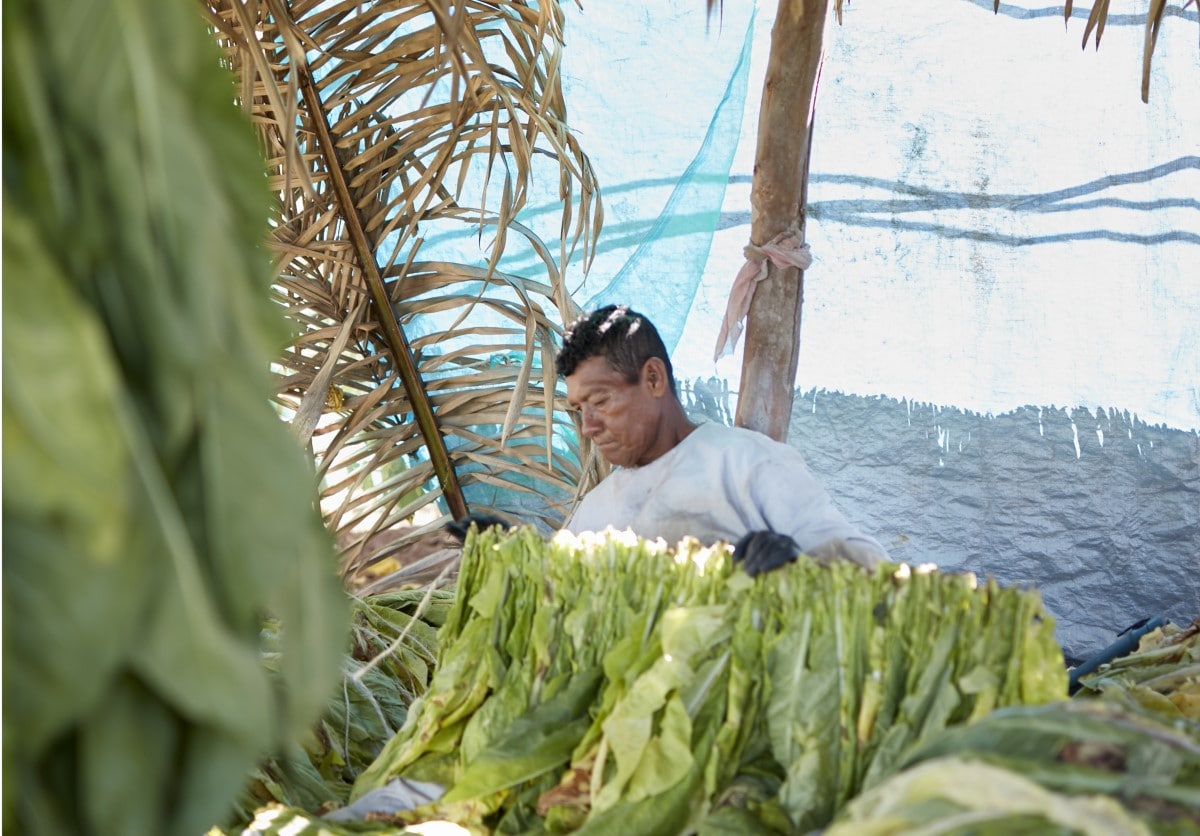
Mexico: Driving change through our human rights impact assessment
The pilot assessment in 2018 triggered action on working hours, road safety, suppliers’ working conditions, and security. Closer analysis of factory work patterns has led to a four-shift model being trialed in the factory operations to address the issue of excessive overtime. To address risks related to road safety and personal security for workers in our distribution supply chain, we are now using GPS tracking on trucks and applying stronger checks on driver qualifications. Regarding the risks revealed in our supply chains, we are now engaging with our suppliers to encourage their efforts to provide good working conditions and fair wages. These actions are intended to prevent risks to third-party workers and other stakeholders resulting from our business.
Our latest HRIA in the Philippines
The assessment began early in 2019 with desktop research, stakeholder mapping, training, and awareness-raising related to the expanded scope of the exercise. Learning from our experience in Mexico the previous year, our preparation in the Philippines included deeper engagement with management teams prior to the start of the exercise, incorporating training on human rights and the assessment process. To open the on-site assessment, our local affiliate PMFTC organized a launch event that welcomed all employees, local NGOs, and government representatives to discuss human rights and the roles that companies and governments have to play in this area. Several in-country visits and interviews followed. Our human rights consultant, Article One, interviewed not only employees and contracted workers, but also our tobacco supplier, farmers, and functional experts. The consultant interviewed, individually or through focus groups, a representative sample of women and men across age groups and functions, including unionized employees of the Marikina factory.
Our assessment revealed several positive developments:
consistent mentions of above-average salaries and industry-leading benefits, training, development, and support for nursing mothers;
recognition of the company as an employer of choice;
a strong culture of safety and security among employees and contractors that extends to their families and communities;
strong awareness of available grievance-raising channels and PMI’s “Speak Up” culture;
a strong commitment to diversity and inclusion, with all feeling welcome and supported;
good level of knowledge among sales teams of PMI’s Marketing Code; and
a leaf supplier fully committed to PMI’s ALP program, with a growing awareness among farmers.
In addition to these positive elements, we noted areas in need of improvement. During the focus group discussions, sales employees – especially women – raised concerns about risks to their personal safety while working in locations with high crime rates. To address these risks, we will undertake mitigating measures, including a review of route assignments in consultation with the sales staff, and ensure that two employees are teamed up when working in identified high-risk areas. The risk for sales employees of being involved in hold-ups also exists. In addition to all necessary security measures applicable, employees will be provided with appropriate counseling. Employees also raised concerns about their long working hours coupled with long commute times. In response, local management will conduct a survey of working hours and driving routes and review relevant compensation schemes.
Despite legal requirements regarding the minimum age for the sale of tobacco products, as well as awareness-raising materials and other measures, sales employees have raised concerns about “sari-sari” small neighborhood stores, which may not always comply with legal age limits. Although PMI neither owns nor has control over these retail points of sale, we recognize that we need to further raise awareness of our own standards, which align with local legislation, and work with these retailers to ensure they do not sell to underage customers. To this end, the market will roll out additional activities with retailers based on PMI’s global youth access prevention program.
Our consultant also raised concerns that the wages of security and janitorial contractors, although fully compliant with legal requirements, may fall below the level of a living wage. We were advised to encourage our service providers to consider implementing performance-based wage increases as an incentive. Based on interviews with farmer representatives and tobacco farmers, our consultant recognized PMI’s commitment to the ALP program and the progress that has been made in its implementation. This includes improvements in growing and working practices, and the overall performance of our supplier in the Philippines. However, farmer representatives also stated that, while the ALP program had improved compliance with personal protective equipment (PPE) requirements, some farmers still refuse to wear safety equipment, potentially leading to green tobacco sickness and other health issues. Providing safe working conditions to both farmers and workers is a key element of our ALP program. Our supplier will continue ensuring the appropriate PPE is available, while raising awareness of safety to encourage behavior change in PPE use. Overall this exercise raised awareness of human rights at the country level and further developed employee competencies and skills to address potential human rights issues. From a corporate perspective, we aim to use local learnings to enhance our global understanding, training, and management of human rights impacts.
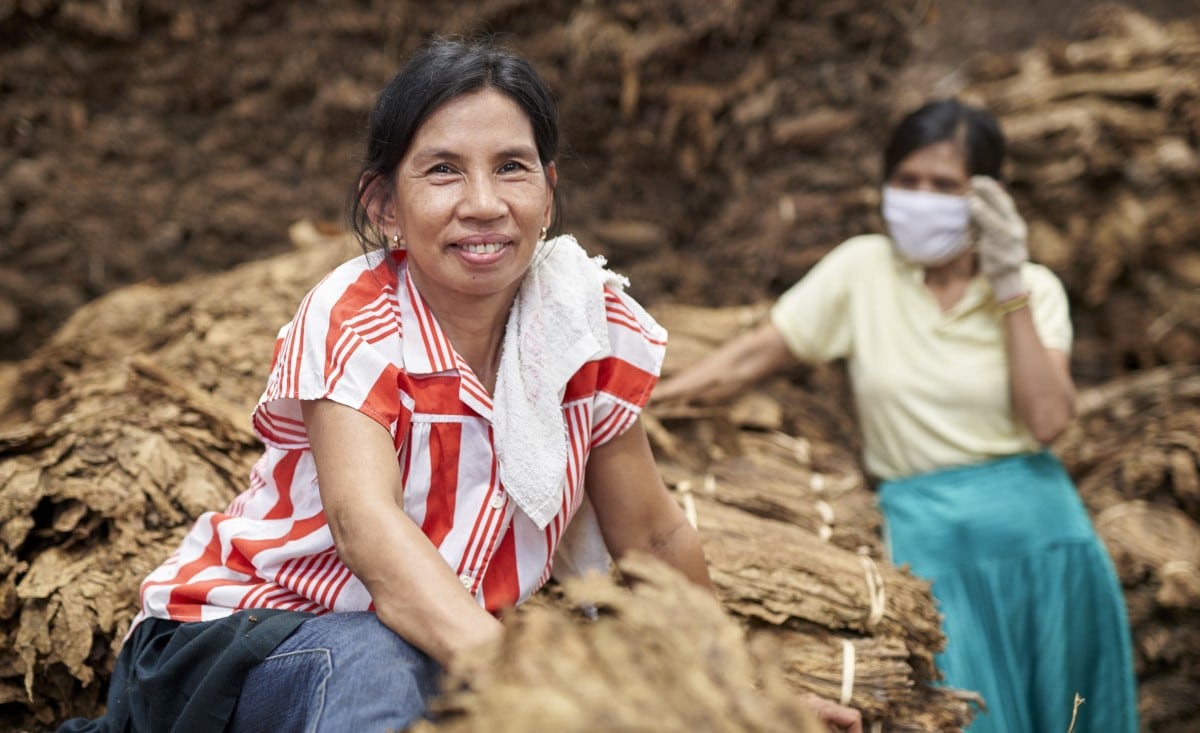
The perspective of our Managing Director in The Philippines
"This iterative process, called ‘Human Rights Impact Assessment,’ requires us to engage with all stakeholders to whom we need to listen and from whom we need to learn. Listening to practitioners and those that confront the challenges is the first ingredient in transformation. And this transformation journey that our company is undergoing is not without new challenges or impacts on human rights – in our operations, supply chain, or even our external engagements. As an industry leader, we need to be humble and open to learning from others’ lessons, build on what works, and together plug the gaps. Together we should reinforce the key message that respect for human rights is possible. It is our responsibility and a major contribution of our business to realizing sustainable development."
Common findings of our HRIA
Based on interviews and focus groups with employees and contractors, the assessments revealed that, in both Mexico and the Philippines, PMI is an employer of choice that inspires pride at work, fosters diversity, and pays above-average wages. Employees are aware of the available grievance mechanisms and are prepared to use them if things go wrong, with evidence showing that PMI’s response is appropriate. Finally, the safety culture within our manufacturing operations proved to be strong in both countries.
We acknowledge that we cannot analyze the complexities of human rights issues in every corner of our operations straight away, but we keep strengthening our processes and deepening our understanding over time based on ongoing learnings. The journey to turn inherent risks into managed risks is ongoing. And we are encouraged by the progress made so far – for instance, on working toward alignment of working hours with the ILO standards, above-average salaries, and cultural openness. Also, thanks to the HRIA, we can shed light on local challenges such as safety issues for commercial teams operating in risky environments or factory employees requesting the review of city areas to be covered by the company’s night transport. Finally, structured tools such as the HRIA provide an important evaluation of how our Guidebook for Success, ALP, RSP, and Marketing Code are implemented on the ground.
Training employees on human rights
Embedding an ethos of respect for human rights in corporate culture starts with awareness-raising and training. We have provided tailored human rights training to the Law department and to regional and market teams within the Security function. In 2019, we also delivered specific training sessions on human rights policies and procedures to 25 percent of PMI’s security personnel.
In 2019, we decided to revamp our human rights e-learning, informed by our most salient risks. The training provides an overview of human rights and key insights into child labor, forced labor, and modern slavery, freedom of association, and environmental impacts. The tool will be rolled out in 2020, and we will report on the uptake in our next report. Human rights topics are also covered by other corporate training with respect to our Guidebook for Success, employment policy, and health, safety, and environment policies.
We decided to revamp our human rights e-learning, informed by our most salient risks
Next steps
We are progressing with the delivery of our Human Rights Roadmap. The rollout of our key diagnostic tool – the HRIA – will continue in 2020 in two geographies. We plan to conduct a full-fledged HRIA in a selected high-risk country, which will deliver in-depth analysis and robust action plans. In parallel, to increase our overall impact on society, we are participating in industry-wide projects. We plan to conduct a focused impact assessment of our tobacco supply chain in Mozambique, which will cover ALP implementation and its effectiveness in addressing risks and impacts. This work will be carried out by a human rights consultant, with other industry peers, working in collaboration with our common supplier in Mozambique. In 2020, we will also review all training materials and delivery methods of our ALP program. The objective is to further align our training with the UNGPs and our step-change approach. In parallel, we will explore new delivery methods such as e-learning and leverage real-life examples.
This online supplement to our integrated report should be read in conjunction with PMI’s Integrated Report 2019. The information and data presented in this online supplement cover the 2019 calendar year or reflect status at December 31, 2019, worldwide, unless otherwise indicated. Where not specified, data come from PMI estimates. See About this online supplement for more information. Aspirational targets and goals do not constitute financial projections, and achievement of future results is subject to risks, uncertainties and inaccurate assumptions, as outlined in our forward-looking and cautionary statements.


